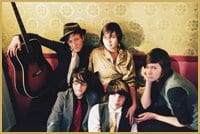To this day, Lorraine Grieves says her first Under the Volcano (UTV) festival blew her mind.
“It was so different than what I encountered growing up in suburbia,” she recalls. “For one, I was grappling with my sexuality and really had no contact with queer people. It was pretty heavy with women and I remember that being super hot and exciting.
“There was also this political edge to it that wasn’t really what I was experiencing in my home community,” she continues. “I just felt like this whole other world opened up to me, and I knew that my people were there.”
Years later, the self-described ‘festival of art and social change’ has grown significantly, and Grieves has grown along with it.
Now an activist and queer mom who works with youth in the Downtown Eastside, Grieves has been on the Volcano’s organizing committee for the past five years. Today she coordinates its information fair, an impressive gathering of activist groups and non-profit organizations from the Lower Mainland and around the world.
Festival producer Meegan Maultsaid has had a much longer tenure with Volcano in terms of years, but a similar story about how the event has shaped her personally and politically.
“I’ve been involved for 11 years. When I initially became involved, my activism and analysis was limited; Volcano allowed me to become more inspired to learn. I feel like I cut my activist teeth through my involvement with UTV.”
While Under the Volcano is not specifically a queer event, more than half its organizing committee identifies as queer. Additionally, a long host of gay and lesbian bands —from The Gossip to Faith Nolan to Po’ Girl and beyond —have been at least partly responsible, over the years, for attracting a sizable contingent of queers to the event.
This year is no exception, as another pair of queer bands worth noting prepare to take the stage. Maultsaid says she’s especially looking forward to seeing the queer Arab hip hop duo named NaR perform.
“They are very political, probably the only Arab hip hop duo around North America,” she says.
“The thing I appreciate about them is that in their bio they state that it is important to talk about ending homophobia but that fits into the larger identity of what they are and do,” she continues. “I identify with that because I’m a queer activist but, first of all, I’m an activist who is queer.”
Then there’s Swan Island, a queercore band out of Portland, Oregon, which is expected to bring an energetic, guitar-driven edge to the Waterfront Stage, according to Volcano’s infrastructure coordinator Mandy Hardwick.
“They are an all-female group making really rhythmic metal pop that is really strong and very powerful. A lot of them are really politically active, making conscious music, which is a nice change for indie rock. Their lead singer is in school doing international studies and she’s pretty radical.”
Beyond these queer musical acts, the day will include Volcano’s usual info fair, its Malcolm Lowry Spoken Word stage, an artisans market, a food fair and the Dragonfly Kidz Festival, consisting of bands, beats, breakdancing and much more.
This year marks Volcano’s 17th anniversary, but the all-volunteer organizing group took a year off last year to reflect and reassess.
“It was really truly to take a breath,” explains Grieves. “The funding got so limited it felt like we were constantly hanging on by our fingernails; it was stressful to wonder if we were going to have to fundraise all year to make up for a loss. We decided to take a year off to recharge our batteries and really look at broadening our relationships with funding sources.”
Despite the persistent funding shortages and stresses, Volcano’s core group still believes so deeply in what they are doing that they have not only donated their time to the event (Maultsaid admits to clocking thousands of hours each year) but also risked their own credit ratings for the festival.
“In the past,” recalls Maultsaid, “our funding sources were so limited and we relied so heavily at the gate it didn’t allow any seed money for the following year. For three years in a row, a few of us took out a $10,000 loan from CCEC [an East Vancouver credit union.]”
As far as the future of Volcano, it is safe to say that the event will continue until its 20th anniversary —funding willing —not just to reach that mark but also to work to bring consciousness about the negative repercussions of the 2010 Olympics to the public.
“I’m all about the power of sport,” says Maultsaid. “Unfortunately the manner in which things like the Olympics are organized do not take things like peoples’ communities, First Nations peoples, gentrification, poverty and homelessness into account. Because it is all about business, it isn’t even about sport. That’s the issue. We’ll continue to bring our anti-Olympic message right up until 2010.”
That said, Maultsaid emphasizes that Under the Volcano is not all gloom and doom. In fact, she says, it might just shake up many people’s preconceptions of how much fun a political festival can be.
“When we’ve gone flyering at Folk Fest, there is good response from some, but others have this idea that we are no fun, we’re the pedantic political pulpit festival where the whole thing is people standing onstage going ‘resist, fight the cops, fight the man!’ Not everyone realizes that we know how to have a good time! We know how to celebrate!
“We’re celebrating something that is extremely crucial for the survival of this planet, but we still know how to have a good time.”

 Why you can trust Xtra
Why you can trust Xtra


